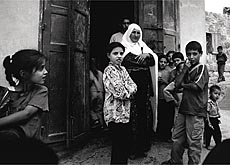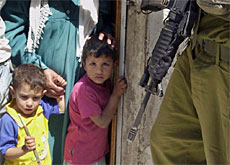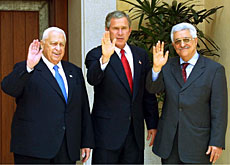Swiss charity sounds alarm in Occupied Territories

A Swiss charity says the Palestinians in the Occupied Territories are in the grip of a humanitarian crisis - despite a United States-backed peace plan.
Terre des Hommes works with mothers and children in a region where half of the inhabitants are dependent on food aid, and a fifth of children are malnourished.
“Five years ago who would have thought that a humanitarian appeal for Palestine would be necessary?” said Michael Keating, the United Nations coordinator for the Palestine territories, in Bern last November.
But despite the UN appeal and the US-backed Road Map peace plan, the region is still facing a humanitarian crisis, says Nathalie Chuard of Terre des Hommes, which is currently carrying out four projects in the West Bank and Gaza Strip.
Chuard has recently returned from a two-month trip to both areas and says the situation has deteriorated since the declaration of the second Palestinian Intifada or uprising against Israel.
“Unemployment has risen during this time from 36 percent to 50 per cent,” Chuard told swissinfo.
Undernourished
The World Bank estimates that the number of people living below the poverty line has doubled since 1998, and that between 60 and 70 per cent of Palestinians are now living on less than two dollars a day.
Chuard says many Palestinians cannot afford food since prices are set at Israeli levels. She adds that 50 per cent of the population is dependent on food aid, according to the UN agency for Palestinian refugees (UNRWA).
Terre des Hommes estimates that over 20 per cent of children are acutely or chronically undernourished. The cash-strapped Palestinian Authority also has trouble financing necessities for the local population.
The problem is exacerbated by Israeli roadblocks, says Chuard, which means food and medication often cannot get through to Palestinian areas, which also suffer from a shortage of trained personnel.
Mothers often seek help too late or not at all due to having to pass through roadblocks.
Advice
Terre des Hommes, which has been active in the Occupied Territories since 1973, is working in hospitals in the West Bank and Gaza as well as helping a medical team that visits villages.
One of the team’s key tasks is to offer mothers advice about nutrition, family planning and hygiene.
In centres in Gaza, Hebron and Jenin, the charity concentrates primarily on feeding undernourished children, especially those from the poorest sectors of society.
Since the beginning of the year, Terre des Hommes has also been involved in a project offering psychological and social support to mothers, children and families.
“Because the everyday life of Palestinian mothers is very hard and stressful, it often happens that they are no longer psychologically able to properly take care of their children,” Chuard told swissinfo.
Road Map
Chuard believes that the Road Map peace plan can only really work if pressure is brought to bear on both sides at the highest levels.
She says that in the past few months Terre des Hommes has seen working conditions deteriorate and no improvement in the daily lives of the Palestinians.
Chuard believes conditions will deteriorate with the building of an Israeli security wall between settlements and Palestinian areas.
“The wall makes the gulf between the Israelis and Palestinians even wider… [I fear] there will never be peace,” she said, adding that the Palestinians feel trapped in a prison by the wall.
The UN’s Michael Keating also alluded to the effects of the wall during his speech in Bern. On the one side, he said, there was a need for security, but on the other a whole population was being punished.
“The vicious circle of violence, retaliation, insecurity, economic crisis, harassment and renewed violence is turning ever faster,” he said.
swissinfo, Jean-Michel Berthoud (translation: Isobel Johnson)
Occupied Territories:
Unemployment – 50%.
Daily wage – 70% live on less than $2 a day.
Dependence on food handouts – over 50%.
Acute or chronic child malnutrition – over 20%.

In compliance with the JTI standards
More: SWI swissinfo.ch certified by the Journalism Trust Initiative


You can find an overview of ongoing debates with our journalists here . Please join us!
If you want to start a conversation about a topic raised in this article or want to report factual errors, email us at english@swissinfo.ch.